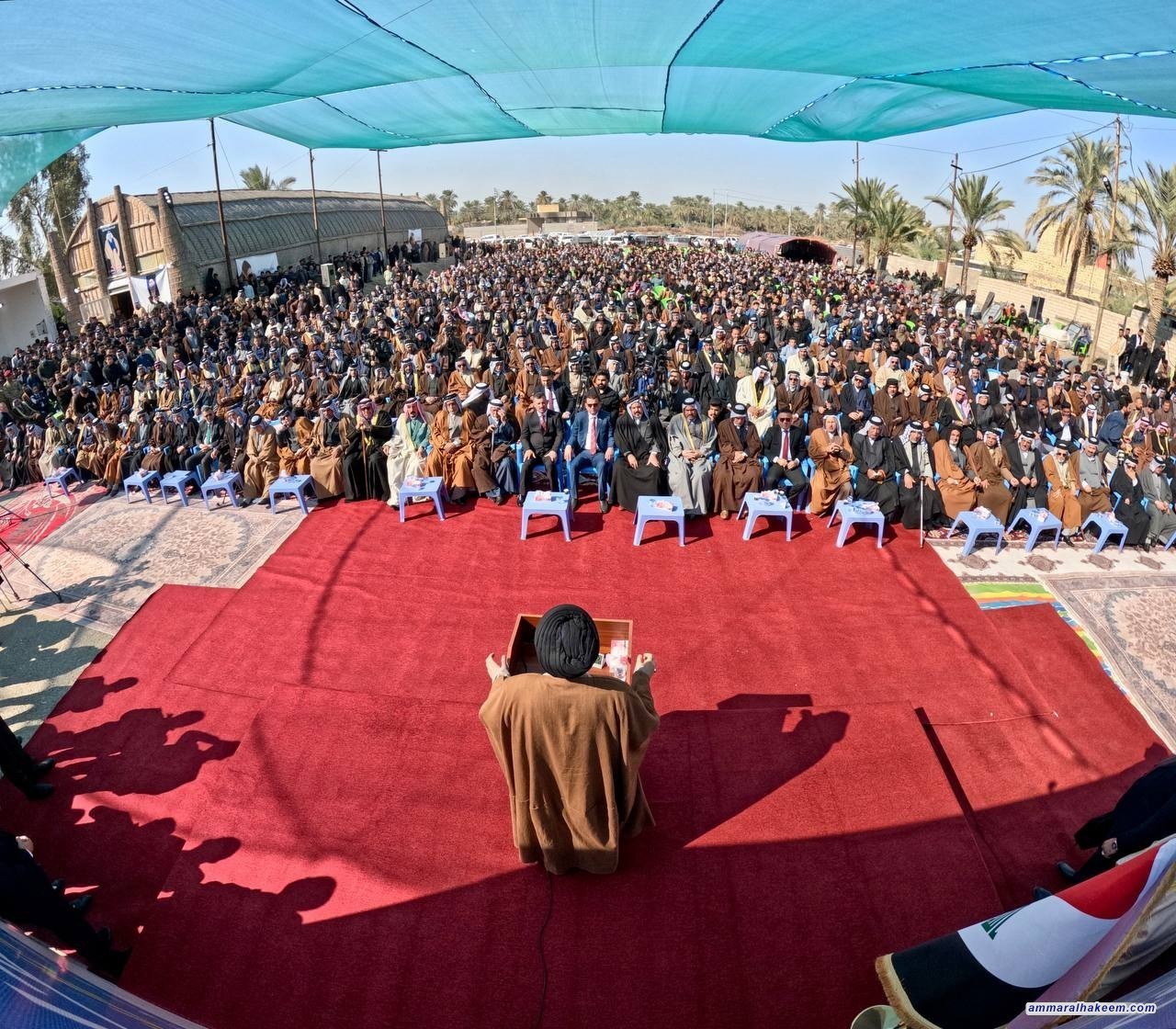Sayyid Al-Hakeem Calls for Tribal Pact, Signed Charter to Safeguard Projects and Reject Saboteurs
As part of his visit to Dhi Qar, Sayyid Ammar Al-Hakeem, Head of the National State Powers’ Alliance, met with a large gathering of Sheiks and dignitaries at the guesthouse of Sheikh Majid Al-Ajeel Al-Hijami in Souq Al-Shuyoukh District. In his speech, H.E. emphasized the deep-rooted historical and national ties between the Al-Hakeem family and Iraq’s noble tribes, tracing these connections back to the esteemed religious authority of Imam Sayyid Mohsen Al-Hakeem (May Allah Sanctify His Soul), through the sacrifices of the Martyr of the Mihrab, Sayyid Mohammed Baqir Al-Hakeem (May Allah Sanctify His Soul), and the shared struggles that have strengthened these bonds over time.
Sayyid Al-Hakeem praised the sacrifices of Dhi Qar’s people in resisting dictatorship and rebuilding Iraq, underscoring their pivotal role in supporting the religious authority and responding to its calls. H.E. highlighted the triad that has preserved Islam in Iraq—the religious authority, Iraqi tribes, and Husseini rituals—which have been present throughout the nation’s defining moments.
Addressing Iraq’s past challenges, Sayyid Al-Hakeem pointed to the collusion between the Ba’ath regime and terrorism, describing ISIS as an extension of this cooperation. H.E. lauded the decisive religious edict issued by the supreme religious authority, which thwarted the terrorist agenda, commending the swift response of Iraqis, particularly the people of Dhi Qar, who stood at the forefront of defending Iraq and serving pilgrims of Imam Hussein (Peace Be Upon Him). H.E. also recognized Souq Al-Shuyoukh procession as one of the largest Husseini processions in the country.
Sayyid Al-Hakeem affirmed that the religious authority has safeguarded all Iraqi communities and stood with them equally, noting that Husseini rituals carry a humanitarian message that transcends all divisions. H.E. further stated that the world views Iraq’s progress with admiration, despite the significant challenges it has faced, and described Iraq’s wise handling of regional affairs as a model to be emulated.
Calling for lasting stability in Dhi Qar, Sayyid Al-Hakeem emphasized that achieving this goal is a collective responsibility. H.E. stressed the need to diversify sources of income and reduce dependence on oil, urging Iraq to learn from other nations’ experiences in attracting foreign investments to stimulate the economy and create job opportunities. H.E. noted that ensuring a secure investment environment would encourage companies to enter Dhi Qar, thereby boosting its economic and political landscape.
Concluding his speech, Sayyid Al-Hakeem called for strengthening security in all its forms—political, social, and physical—emphasizing the crucial role of tribes in maintaining stability. H.E. proposed forming a tribal pact and signing a charter among Dhi Qar’s tribal leaders to protect development projects and denounce any party seeking to sabotage them. H.E. stressed that such an initiative would reassure investors and companies, ultimately contributing to the province’s development and long-term stability.


/9/3/photo_2025-12-10_09-25-13.jpg)
/9/2/photo_2025-12-10_09-17-58.jpg)
/9/1/photo_2025-12-10_09-11-13.jpg)
/8/3/photo_2025-12-09_10-42-49.jpg)
/8/2/photo_2025-12-09_10-37-31.jpg)
/8/1/photo_2025-12-09_09-54-18.jpg)
/7/1/photo_2025-12-08_09-38-41.jpg)
/5/1/photo_2025-12-07_09-25-35.jpg)
/3/2/photo_2025-12-04_11-05-55.jpg)
/3/1/photo_2025-12-03_11-49-28.jpg)